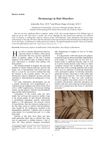 116 citations,
February 2017 in “Journal of the American Academy of Dermatology”
116 citations,
February 2017 in “Journal of the American Academy of Dermatology” JAK inhibitors help with skin conditions but need more research on dosing and safety.
[object Object] 64 citations,
January 2009 in “Canadian Journal of Gastroenterology” Interferon and ribavirin can cause serious skin reactions and other health issues.
 58 citations,
October 2001 in “Dermatologic Clinics”
58 citations,
October 2001 in “Dermatologic Clinics” Hair loss can indicate underlying systemic diseases and addressing these can sometimes reverse the hair loss.
50 citations,
May 2021 in “Frontiers in immunology” Certain immune cells contribute to skin autoimmune diseases, and some treatments can reverse hair loss in these conditions.
 43 citations,
February 2019 in “International immunology”
43 citations,
February 2019 in “International immunology” Special immune cells called Regulatory T cells help control skin inflammation and repair in various skin diseases.
 41 citations,
January 2014 in “Annals of Dermatology”
41 citations,
January 2014 in “Annals of Dermatology” Dermoscopic examination helps diagnose different types of hair loss conditions by showing specific patterns.
 41 citations,
February 1970 in “Archives of Dermatology”
41 citations,
February 1970 in “Archives of Dermatology” Oral contraceptives can cause skin issues like dark patches, acne, yeast infections, sensitivity to light, spider veins, skin rashes, and hair loss.
 39 citations,
July 2008 in “Dermatologic Therapy”
39 citations,
July 2008 in “Dermatologic Therapy” Pseudopelade of Brocq is a unique hair loss condition, but its cause and development are still not fully understood.
 35 citations,
August 2001 in “Journal of Cutaneous Medicine and Surgery”
35 citations,
August 2001 in “Journal of Cutaneous Medicine and Surgery” Tacrolimus is effective for various skin conditions with fewer side effects than cyclosporine.
33 citations,
December 2014 in “Journal of the European Academy of Dermatology and Venereology” Lichen planus is linked to several autoimmune diseases.
 28 citations,
September 1998 in “Medical Clinics of North America”
28 citations,
September 1998 in “Medical Clinics of North America” Most hair loss can be diagnosed with patient history and physical exam, and a few common types make up most cases.
 20 citations,
July 2000 in “PubMed”
20 citations,
July 2000 in “PubMed” The document outlines a method for diagnosing hair loss and suggests specific treatments based on the diagnosis.
 12 citations,
March 2022 in “Frontiers in Nutrition”
12 citations,
March 2022 in “Frontiers in Nutrition” Obesity is linked to various skin conditions and issues, and losing weight can improve these conditions.
 12 citations,
October 2018 in “International Journal of Women's Dermatology”
12 citations,
October 2018 in “International Journal of Women's Dermatology” Hormone therapy in transgender women can affect hair growth and acne, and there are specific skin issues related to gender-affirming surgery, but more research is needed on their dermatological health.
 12 citations,
January 2014 in “Menoufia Medical Journal”
12 citations,
January 2014 in “Menoufia Medical Journal” Dermoscopy improves diagnosis of hair and scalp disorders and can help avoid unnecessary biopsies.
[object Object]  8 citations,
February 2022 in “Vascular Health and Risk Management”
8 citations,
February 2022 in “Vascular Health and Risk Management” Some skin conditions may increase the risk of heart disease, and understanding their connection could lead to better treatments.
 4 citations,
September 2012 in “Journal of Nanoscience and Nanotechnology”
4 citations,
September 2012 in “Journal of Nanoscience and Nanotechnology” Dermoscopy helps dermatologists diagnose different types of hair loss accurately without always needing a biopsy.
 4 citations,
July 2001 in “Journal of Cutaneous Medicine and Surgery”
4 citations,
July 2001 in “Journal of Cutaneous Medicine and Surgery” Tacrolimus is an effective treatment for several skin conditions with fewer side effects than cyclosporine.
 3 citations,
January 2020 in “Clinical dermatology review”
3 citations,
January 2020 in “Clinical dermatology review” Trichoscopy is useful for diagnosing hair and scalp disorders in people with darker skin.
 3 citations,
November 1999 in “Journal of Cutaneous Medicine and Surgery”
3 citations,
November 1999 in “Journal of Cutaneous Medicine and Surgery” Examining scalp biopsies in different ways helps better diagnose hair loss types.
 2 citations,
January 2019
2 citations,
January 2019 The document concludes that autoimmune skin disorders are treated with corticosteroids and immunosuppressive drugs.
 2 citations,
July 2018 in “Elsevier eBooks”
2 citations,
July 2018 in “Elsevier eBooks” Trichoscopy is a useful tool for diagnosing and managing hair and scalp conditions, often better than traditional methods.
 2 citations,
February 2018 in “InTech eBooks”
2 citations,
February 2018 in “InTech eBooks” TNF-alpha inhibitors can cause various immune-related skin issues.
2 citations,
January 2015 in “Elsevier eBooks” Epigenetic changes contribute to autoimmune skin diseases.
 2 citations,
May 2014 in “Journal of the Egyptian Women's Dermatologic Society (Print)”
2 citations,
May 2014 in “Journal of the Egyptian Women's Dermatologic Society (Print)” Dermoscopy helps diagnose different scalp conditions by showing unique signs for each disorder.
 2 citations,
December 2004 in “Medicine”
2 citations,
December 2004 in “Medicine” Different hair and scalp disorders cause hair loss or excess hair growth, with various treatments available depending on the specific condition.
 2 citations,
June 1980 in “International Journal of Dermatology”
2 citations,
June 1980 in “International Journal of Dermatology” Scalp biopsies are important for diagnosing hair loss conditions.
 1 citations,
May 2020 in “Journal of The American Academy of Dermatology”
1 citations,
May 2020 in “Journal of The American Academy of Dermatology” The authors agree more research with proper control groups is needed to understand hair loss.
 1 citations,
January 1967 in “The BMJ”
1 citations,
January 1967 in “The BMJ” The document concludes that while some hair and scalp disorders can be treated, hair loss from destroyed follicles is permanent, and damaged hair can only regrow naturally.

COVID-19 can lead to different skin symptoms and might trigger autoimmune diseases in genetically susceptible people.


























